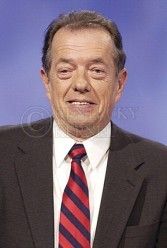Gubernatorial candidates discuss education, economy
October 24, 2011
[/caption]
Two gubernatorial candidates attended Sunday night’s debate, sponsored by Student Government’s Wildcat Interest Group.
Incumbent Gov. Steve Beshear did not attend the event due to a scheduling conflict.
“We thank our governor Steve Beshear also for showing up tonight as well,” Independent candidate Gatewood Galbraith said sarcastically to start off the discussion.
Journalism professor Buck Ryan moderated the debate and noted the debate’s importance.
“This is a debate about the election for government, but also a lesson in education,” Ryan said.
UK students and members of the public emailed questions to UK Student Government, tweeted them online or asked questions during the discussion.
Education in Kentucky was the major topic of the debate.
David Williams, the current state Senate president, started the discussion by talking about the students.
“I’ve tried to talk about the students’ future and the future of Kentucky,” Williams said. “I believe campaigns ought to be about having an open dialogue.”
One question addressed making a decision about moderating tuition if either of the candidates were elected governor, and discussed the possibility of a freeze on tuition.
Galbraith pointed out the state needs to be more transparent, and also addressed the state’s financial woes.
“The state of Kentucky is $38 billion in debt,” he said. “What are we doing handing over those bonds to Chase Manhattan Bank when the banks in New York are the cause of the nation’s economic situation to begin with? We need more transparency. I’ve already told you more than I know.”
The candidates also mentioned how they would work with President Eli Capilouto to continue to work on the Top 20 plan.
“I am glad to work with any university president, and I wish the best of luck to him,” Williams said.
Williams said his platform has strong beliefs about properly funding Kentucky’s colleges and universities through the Brains for Bucks initiative.
“It gives us the opportunity to attract better faculty through research funding, and faculty are the most important part in the college experience,” he said.
Galbraith stressed to the UK students at the debate that they must be watchdogs when it comes to the state government’s actions.
“You have to be self-sufficient,” Galbraith said. “You can not always trust the government’s decisions.”
The candidates also addressed questions concerning the state budget, the possible expansion of gambling and green energy.
“The states have gotten to where they are becoming more dependent on the federal government,” Galbraith said. “Forty percent of the state budget comes from federal funds.”
Williams said the state has a severe budget problem.
“I think that we should live within our means. There is about a $650 million deficit that will not allow for expanding the state budget. This governor is not being completely honest with the people,” Williams said.
Williams also challenged Beshear’s beliefs about expanding gambling in the state.
“We have a luke-warm governor, and he needs to present his stance before the election,” he said. “Racing’s natural enemy is the slot machine. Churchill Downs is a gambling institution. They do not have the interests of the owners and the breeders.”
Both Galbraith and Williams agreed that Kentucky needs to change its tax code.
“We have to change our tax structure to one that will reward productivity,” Williams said.
Galbraith said it is time Kentucky has a new outlook on the state budget.
“I have the outlook of the founding fathers – to do what’s best to protect the rights of the people,” Galbraith said.
In their closing remarks, each of the governor hopefuls stressed the need for change in the state government’s direction.
“I’m a perennial candidate because Kentucky has perennial problems,” Galbraith said. “I don’t care which party gets the credit for success. I would like to see both parties freed up from the politics they’ve gotten themselves in. I want to work to best protect the rights of the people of Kentucky.”
Williams said he can promote cohesiveness.
“I can bring the parties together. I can more importantly bring the people together. It’s about being constructive and building from the bottom up, not tearing people down,” Williams said. “We’ve got to have some change.”




















































































































































